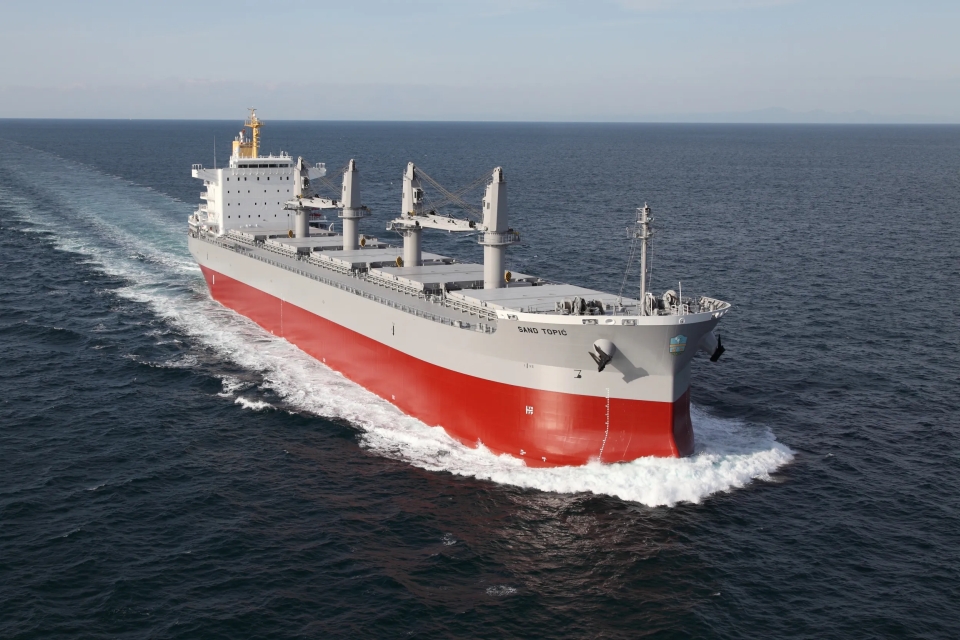The EUR 17 million European GAMMA project seeks to make international shipping climate neutral. For the project, companies and researchers from Europe will develop and convert a bulk carrier to sail on climate-neutral fuels and green power.
60,000 tonnes dead weight. That is how much cargo the bulk carrier from TOPIC Fleet, which is used as the case study in the new EU project GAMMA, can carry across the world’s oceans. Ocean freight transport requires large amounts of fuel, mainly made up of fossil fuels today. With the GAMMA innovation project, which began in January 2024, a wide range of partners are now working to change that.
Kjartan Due Nielsen, Innovation Manager at Icelandic engineering company Verkís, which is leading the GAMMA project: ‘On behalf of the entire group of partners, I can say that we are proud and grateful that the European Commission has chosen to support the GAMMA project and efforts to convert international shipping in a greener direction.’
‘We will retrofit a bulk carrier with highly innovative technologies and during a demonstration campaign we will prove that it is possible to replace auxiliary generators with a new fuel system that runs on e-fuels,’ explains Nielsen. ‘After proof of concept in GAMMA, the next step would be to replace the main engines of a ship for a full energy transition. All in all, the project is very visionary, and could be a green game changer for shipping in the future.’
Also read: How Aurelia wants to cut emissions of Carisbrooke’s Vectis Pride
Climate targets for 2050
The International Maritime Organization (IMO) has set a goal for the maritime sector to reduce the industry’s greenhouse gas emissions to around net-zero by 2050. The five-year GAMMA project will contribute to this, say representatives from the start-up company Aurelia, which specialises in the concept design of climate-friendly vessels.
Elena Prato of Aurelia: ‘This will include covering and supervising the engineering tasks behind the design and the integration of new green technologies into the ship without compromising its operational capabilities. The integration will be based on a trade-off between weight, volume, cost and, above all, safety. Our challenge is to consider how the systems will impact on the current vessel and to maintain safety in all operations. In this project, we will link a range of technical competences across the sixteen partners from Europe for the benefit of all.’
Also read: Wind-solar retrofit project WHISPER wins EU funding
Electricity from hydrogen and green fuels
An innovative fuel system will be installed. Ammonia and green methanol will be bunkered on-to the ship and then converted into hydrogen with cracker and reformer technologies. The hydrogen will be purified and then converted into electricity with a fuel cell, which will be providing electric energy to the vessel and thus replacing the use of the auxiliary generators running on fossil fuel.
In addition to that, the partners have gone further, since part of the energy necessary to convert to hydrogen will be supplied by renewable energy, in this case PV panels, which will be installed on the hatch covers of the bulk carrier.
Fraunhofer Institute provides the conversion technology, Amnis Pura the purifying and the fuel cell is provided by Ballard Power Systems Europe, meanwhile PV panels will be provided by Italian company Solbian.
To evaluate the environmental performance of the technologies in the project, Politecnico di Milano will perform a well-to-wake analysis and calculate the CO2 emissions.
Also read: AiP for Aurelia’s green retrofit solution for a bulk carrier
GAMMA project
The Gamma project began in January 2024 and will run for five years. The innovation project has received EUR 13 million in support from the European Commission’s Horizon Europe framework programme for innovation. The total budget is EUR 17 million, and the complex application process was led by Inspiralia. Gamma stands for Green Ammonia and Biomethanol fuel MAritime Vessels.
The project involves sixteen partners from Europe: Verkís (Iceland), ANT Topic (Italy), Fraunhofer (Germany), Aurelia (Netherlands), Ballard (Denmark), Sea Green Engineering (Italy), Energy Cluster Denmark (Denmark), SINTEF (Norway), Solbian (Italy), Amethyste (France), Elkon Elektrik (Turkey), Politecnico di Milano (Italy), ARM Engineering (France), RINA (Germany), Amnis Pura (Portugal) and Dotcom (Italy).
Picture by Aurelia.








